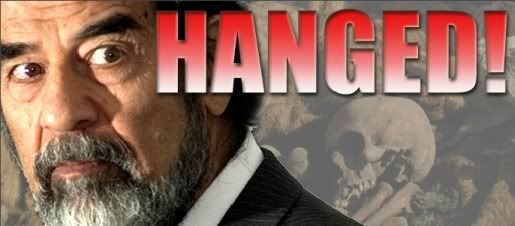Two Different Times, Two Different Deaths
 Thank you to the Times of London for a forthright and no holds barred obituary of Saddam Hussein. (What a joy to put those last four words together!) It begins:
Thank you to the Times of London for a forthright and no holds barred obituary of Saddam Hussein. (What a joy to put those last four words together!) It begins:Saddam Hussein was a tyrant whose actions brought down unimaginable catastrophe on Iraq and its peoples. From an early age, he had enjoyed inflicted suffering on those around him and, when he came to positions of political power, those whom he could not force or corrupt into submitting to his will, he maimed, murdered or made to flee.To those who fret that the US has brought violence to Iraq, consider this:
He started two major international wars - one against Iran, the second as a result of aggression against Kuwait - which cost an estimated one million lives. He instituted genocidal campaigns against the Kurds in the north of Iraq and the Marsh Arabs in the south. Ruling through the Sunni minority of which he was a member, he ignored the claims of the country's majority Shia population.
Saddam's schooling began at the age of seven in Tikrit. Such was the lawless environment around him that, on his first day at school, he carried a steel bar in his hand and a loaded revolver in his pocket, the latter bought for him by his relatives.The refresher course in the history of Iraq provided by the obituary tells us a few things: First, the difficulty of the task of democratizing Iraq should have been very clear to everyone from George Bush to George Soros on down; this is a terribly disfunctional nation with a long history of blood, deceit, back-stabbing and hatred.
And second, it was worth trying. To leave in power a man like Hussein, who was ...
A fervent admirer of Hitler on account of the latter's boldness and hatred of Jews, he told his official biographer in 1980 that he wanted Iraqis to think of Nebuchadnezzar every day. "We could march into Palestine and bring all those Jews here in Babylon with their hands tied behind their backs once more" ...... would be to leave an impossible barrier to improvement in the affairs of the middle east.
Finally, it tells us that the Iraq of today, violent and unstable as it is, is a vast improvement over the Iraq that was, or the Iraq that would have been if Saddam were still in power.
Meanwhile at home, our Times, the one from New York, the one that is a vapid, vile vapor compared to the one of London, led with this pathetic attempt to find sourness and anti-Bushism in the news:
CRAWFORD, Tex., Dec. 29 — The capture of Saddam Hussein three years ago was a jubilant moment for the White House, hailed by President Bush in a televised address from the Cabinet Room. The execution of Mr. Hussein, though, seemed hardly to inspire the same sentiment.
Before the hanging was carried out in Baghdad, Mr. Bush went to sleep here at his ranch and was not roused when the news came. In a statement written in advance, the president said the execution would not end the violence in Iraq. ...Now, what could have been a triumphal bookend to the American invasion of Iraq has instead been dampened by the grim reality of conditions on the ground there. Mr. Hussein’s hanging means that the ousted leader has been held accountable for his misdeeds, fulfilling the American war aim most cited by the White House after Iraq’s weapons of mass destruction proved nonexistent.
But that war is now edging toward its fifth year, and the sectarian violence that has surged independent of any old Sunni or Baathist allegiances to Mr. Hussein has raised questions about what change, if any, his death might bring.
One change comes to mind immediately. The majority of Iraqis were oppressed by Saddam and they've seen their government -- not the "American occupiers" but their government -- lawfully try, validly convict and honorably dispose of the despot. That is a bright example of a new nation of laws, and that should be a matter of great pride for the lawful Iraqis, and a strong motivator to dispose of the insurgents who hang on to Saddam's Iraq and move on to a new Iraq.
But I'm not a professional NYT journalist, so what do I know?
hat-tip: Hot Air. Image: Fox News
Related Tags: Saddam, Hussein, Iraq, War on terror, Terrorism




<< Home